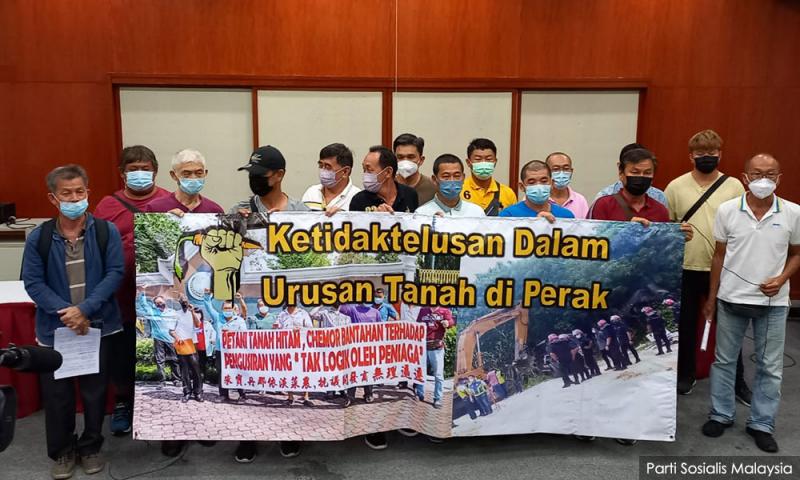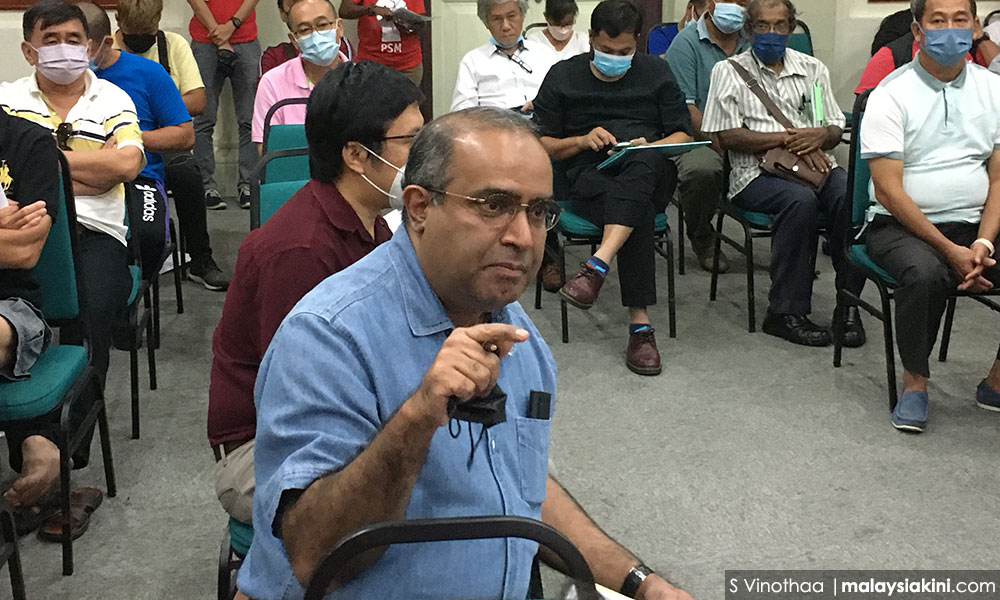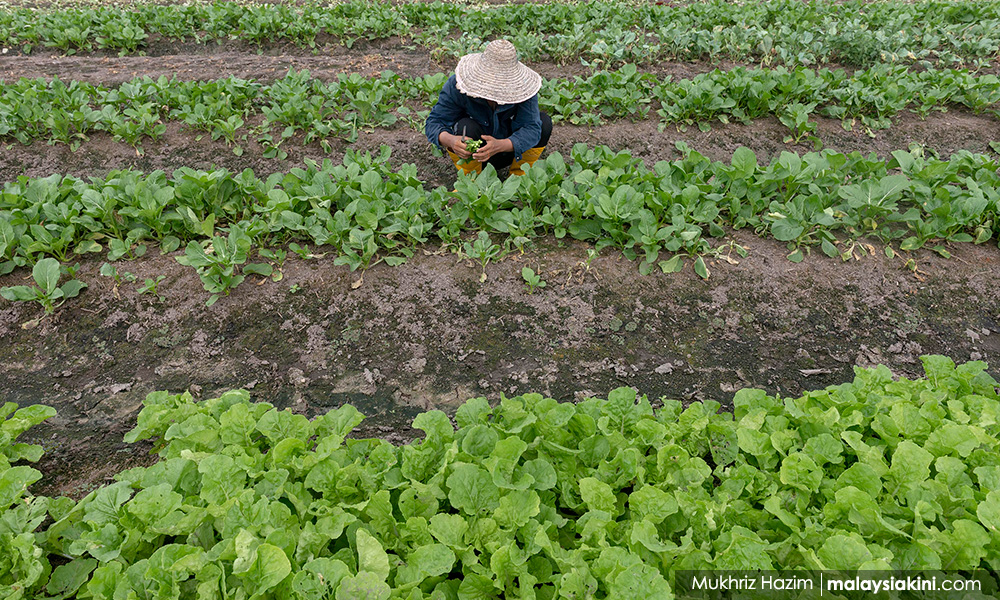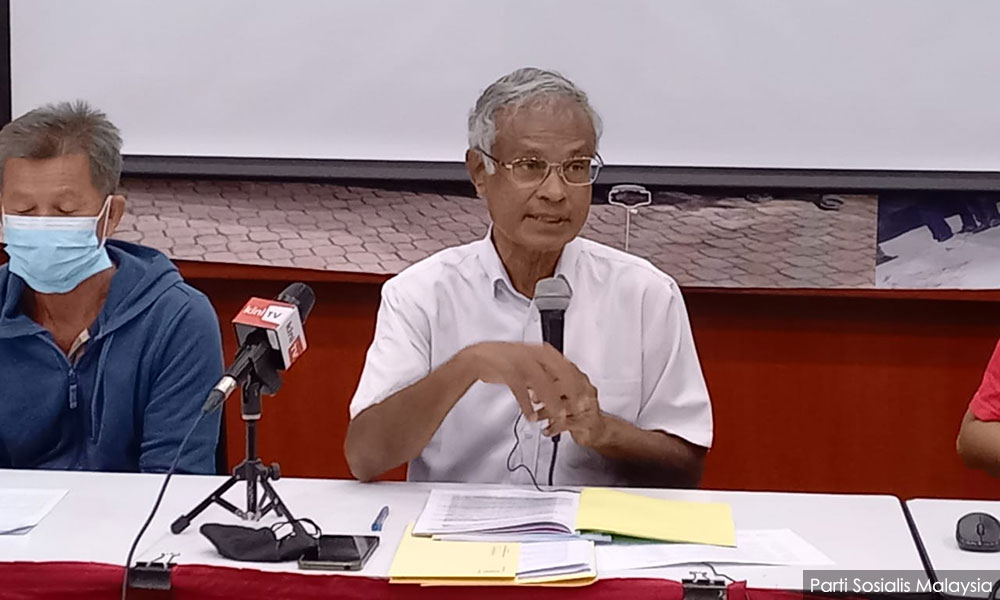
Farmers urged to show public how state power abused for evictions
Political economist professor Edmund Terence Gomez's strong advice to 329 farmers being evicted in Perak is to demonstrate how political, institutional and economic arrangements within the state had led to their marginalisation.
Speaking from an audience composed of NGOs and individuals attending a meeting to discuss support for the farmers, Gomez said, "show how the state has manoeuvred itself to centralise power to one man - the menteri besar."
The farmers, which formed Gabungan Petani, are from 11 areas and faced forced evictions involving an accumulated 1,832 acres of agricultural land and were led by PSM chairperson Dr Michael Jeyakumar Devaraj.
Jeyakumar himself was recently investigated under Section 505(C) of the Penal Code and Section 233 of the Communications and Multimedia Act over a Facebook posting demanding the release of a farmer arrested in Perak on April 8.
Dissecting the cases of the 11 areas in question, Gomez urged the group to show the courts how the menteri besar usurped the power of the state through subdivision of power which allowed him to be the sole decision-maker on what happened to the land.
He explained that the group needed to return to the actual source of the problem.
"Once he (the menteri besar) gives (sells) the land, the developer owns it," he said.

Economist Edmund Terence Gomez speaking to Perak farmers and members of NGOs on the issue of evictions
Referring to a case in Chemor involving 20 farmers occupying eight acres of land, Gomez questioned the basis for which the land was being taken from the farmers who were bequeathed the land in trust to be developed for agriculture.
He pointed out that this was a valid question, especially because the farmers had not done anything wrong with the land.
"History is forgotten in this situation when 30 years ago the government had alienated the land to the farmers to use as they wished for agriculture purposes.
"They were ownership in trust (sic), and now the state was taking it away, but on what basis?" he asked.
Food items still below self-sufficiency after a decade
Seeking more public support for their cause, Jeyakumar said the group called for the meeting yesterday to explain to NGOs and the public how farming land in Perak was mismanaged.
The eviction of farmers also brought Malaysia's increased dependence on food imports to light. In its 2021 Box Report Quarterly Bulletin, Bank Negara Malaysia reported that 13 out of 14 food items that were below self-sufficient levels in 2011 had remained so after a decade.
The report revealed that the population had become increasingly reliant on imports to meet the growing demand for meats and several fruits and vegetables.
Due to greater food import dependency and an underdeveloped agro-food sector, the report said that Malaysia has been recording increasing food trade deficits over the years.
Essentially, the report revealed that, on average, the net food import bill of a Malaysian had grown faster than their income, despite the country's vast resources and latent potential in the agro-food industry.
Referring to a case in Chemor involving 20 farmers occupying eight acres of land, Gomez questioned the basis for which the land was being taken from the farmers who were bequeathed the land in trust to be developed for agriculture.
He pointed out that this was a valid question, especially because the farmers had not done anything wrong with the land.
"History is forgotten in this situation when 30 years ago the government had alienated the land to the farmers to use as they wished for agriculture purposes.
"They were ownership in trust (sic), and now the state was taking it away, but on what basis?" he asked.
Food items still below self-sufficiency after a decade
Seeking more public support for their cause, Jeyakumar said the group called for the meeting yesterday to explain to NGOs and the public how farming land in Perak was mismanaged.
The eviction of farmers also brought Malaysia's increased dependence on food imports to light. In its 2021 Box Report Quarterly Bulletin, Bank Negara Malaysia reported that 13 out of 14 food items that were below self-sufficient levels in 2011 had remained so after a decade.
The report revealed that the population had become increasingly reliant on imports to meet the growing demand for meats and several fruits and vegetables.
Due to greater food import dependency and an underdeveloped agro-food sector, the report said that Malaysia has been recording increasing food trade deficits over the years.
Essentially, the report revealed that, on average, the net food import bill of a Malaysian had grown faster than their income, despite the country's vast resources and latent potential in the agro-food industry.

'If farmers walk away from trouble…'
Farmer Michael Fong, in his appeal to the public, said this problem was not theirs alone but a societal issue that needed to be addressed today.
"Our government doesn't understand food security, and everyone wants to become rich quickly," he said.
Fong said only a few farmers were brave enough to question the state's actions, explaining that most farmers were intimidated by police arrests.
"Most farmers don't want trouble, but if farmers walk away from trouble, Malaysia is in trouble," he said.
Still seeking lawyers to take their case
Of the 11 plots of agricultural land in question, developers have already managed to evict 100 farmers from a farm in Kampar, while 16 farmers in Tanah Hitam are appealing their case to the menteri besar.
In Kuala Kuang, eight farmers who have been cultivating 56 acres of land since before World War II have received a lawyer's notice from the developer accusing them of illegal occupancy.
The land here had also been cultivated by fish, cattle and buffalo farmers.
Meanwhile, 31 farmers in Chemor and in another part of Tanah Hitam are seeking out lawyers to take on their case.
The Land Office gave the farmers in the latter area an eviction notice to award parcels of the plot to the state football team players.
The remaining 174 farmers in Bidor, Kuala Kuang, Chemor, Kampar, and Pusing, whose cases have already commenced in court, are afraid that they are fighting a losing battle as the local land laws did not favour them.
Appealing to Perak Ruler and cabinet
Jeyakumar said apart from garnering public support, the group would appeal to the Perak ruler Sultan Nazrin Shah to set up a state-level royal commission to investigate the management of agriculture farms in the state.
He said the letter would be sent to explain to Sultan Nazrin how small farmers were being evicted by developers or government agencies like the Perak State Development Corporation or the Perak State Agriculture Development Corporation.
"The farmers occupying the land are very experienced as they have been cultivating the land for the past 80 years, and their know-how is an asset to the nation that should be protected," he said.

PSM chairperson Dr Michael Jeyakumar Devaraj
Jeyakumar said a similar letter would be sent to the cabinet committee on National Food Security Policy, calling for a task force to study the protection of agriculture farmers in Perak.
"We will also ask for the task force to be structured as an advisory role to the Perak state government in the management of sustainable farming," he explained, adding that they would need public support in these two efforts.
Independent committee on unwarranted evictions
Jeyakumar also said the state land regulations and the National Land Code didn't have sufficient mechanisms for checks and balances.
"We have sent a memorandum to the chief minister recommending the need for an independent land board that can be part of the Perak Land Regulations 1966.
"We have proposed that the independent board be given the authority to veto proposed plans by the State Development Corporation or the State Agriculture Development Corporation.
"Should the respective authority want to overcome that veto, they can make their case at the state assembly," he said.
Jeyakumar said the independent board would be the first of its kind and designed to introduce unprecedented transparency in the development of government land.
Jeyakumar said a similar letter would be sent to the cabinet committee on National Food Security Policy, calling for a task force to study the protection of agriculture farmers in Perak.
"We will also ask for the task force to be structured as an advisory role to the Perak state government in the management of sustainable farming," he explained, adding that they would need public support in these two efforts.
Independent committee on unwarranted evictions
Jeyakumar also said the state land regulations and the National Land Code didn't have sufficient mechanisms for checks and balances.
"We have sent a memorandum to the chief minister recommending the need for an independent land board that can be part of the Perak Land Regulations 1966.
"We have proposed that the independent board be given the authority to veto proposed plans by the State Development Corporation or the State Agriculture Development Corporation.
"Should the respective authority want to overcome that veto, they can make their case at the state assembly," he said.
Jeyakumar said the independent board would be the first of its kind and designed to introduce unprecedented transparency in the development of government land.
The key word is "Chinese" isn't it? I hope to be proven wrong.
ReplyDeleteExcellent opportunity for MCA to come in at this juncture and be a hero. ..ahahahaha
ReplyDelete